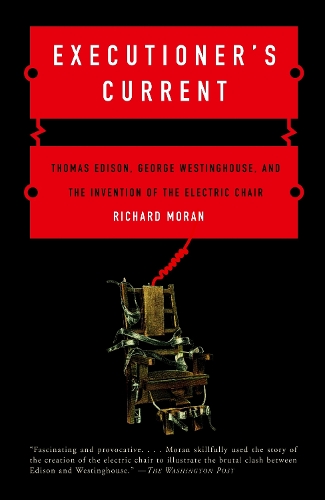
Executioner's Current: Thomas Edison, George Westinghouse, and the Invention of the Electric Chair
(Paperback)
Publishing Details
Executioner's Current: Thomas Edison, George Westinghouse, and the Invention of the Electric Chair
By (Author) Richard Moran
Random House USA Inc
Vintage Books
15th November 2003
United States
Classifications
General
Non Fiction
Penology and punishment
364.66
Physical Properties
Paperback
304
Width 132mm, Height 203mm, Spine 16mm
279g
Description
Thomas Edison, George Westinghouse, and the Invention of the Electric Chair A "fascinating and provocative" story (The Washington Post) of high stakes competition between two titans that shows how the electric chair developed through an effort by one nineteenth-century electric company to discredit the other. In 1882, Thomas Edison ushered in the "age of electricity" when he illuminated Manhattan's Pearl Street with his direct current (DC) system. Six years later, George Westinghouse lit up Buffalo with his less expensive alternating current (AC). The two men quickly became locked in a fierce rivalry, made all the more complicated by a novel new application for their product- the electric chair. When Edison set out to persuade the state of New York to use Westinghouse's current to execute condemned criminals, Westinghouse fought back in court, attempting to stop the first electrocution and keep AC from becoming the "executioner's current." In this meticulously researched account of the ensuing legal battle and the horribly botched first execution, Moran raises disturbing questions not only about electrocution, but about about our society's tendency to rely on new technologies to answer moral questions.
Reviews
Fascinating and provocative. . . . Moran skillfully used the story of the creation of the electric chair to illustrate the brutal clash between Edison and Westinghouse. The Washington Post Book World
Fascinating. . . . Moran conclusively shows that Edison hoped to discredit alternating current--by associating it in the public mind with death--and advance his own direct current." Los Angeles Times
"Chilling. . . . A 'Coke-versus-Pepsi' story as if told by Stephen King. . . . A macabre jolt of history." Chicago Sun-Times
A remarkable account. . . . A fantastic tale, well told. Forbes
[An] engaging analysis of the relationship between electrocution and the personal and corporate battles waged between Edison and Westinghouse. Louis P. Masur, Chicago Tribune
Richard Moran shows us not only how the death penalty in America affects condemned prisoners, but also how it is used by powerful interests in our society to further their own political and economic ends. . . . Five stars, and three cheers, for Professor Moran! Sister Helen Prejean, author of Dead Man Walking
Riveting. . . . Moran [has a] lively reportorial style. . . . In this narrative of callous ambition and hypocrisy, a condemned criminal plays an unexpectedly dignified role. Seattle Weekly
"Compelling. . . . Reads like pages torn from today's headlines about nefarious CEOs and corporate greed." Albany Times Union
Haunting. Incisive A chilling look at something that has become a too-common theme of modern times: the use of technology to develop new ways of killing. Roanoke Times
An eye-opening and riveting account of the battle for the future of electricity and the part that played in changing the technology of execution. Wilmington Sunday News Journal
Author Bio
RICHARD MORAN is professor of sociology at Mount Holyoke College and the author of Knowing Right from Wrong- The Insanity Defense of Daniel McNaughtan and numerous articles and reviews. He has also served as a commentator for National Public Radio's Morning Edition and written op-eds for the Boston Globe, Washington Post, Los Angeles Times, Philadelphia Inquirer, Chicago Tribune, Christian Science Monitor, New York Times, Newsweek, and The Wall Street Journal. He lives in South Hadley, Massachusetts.
